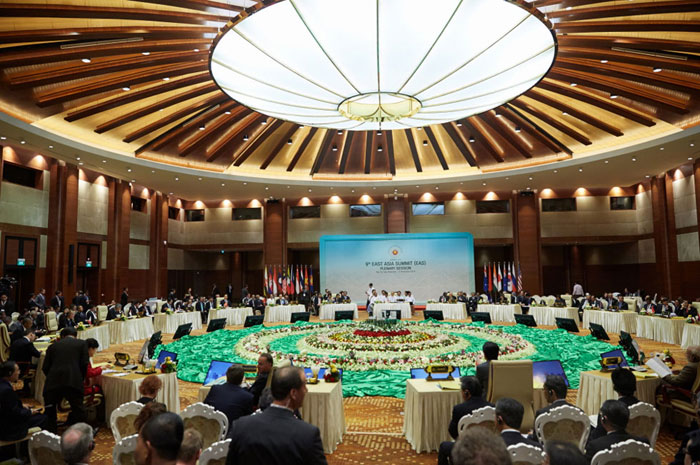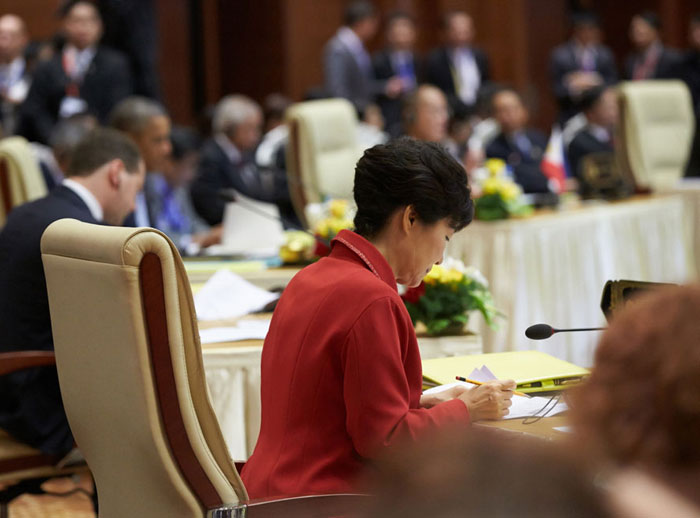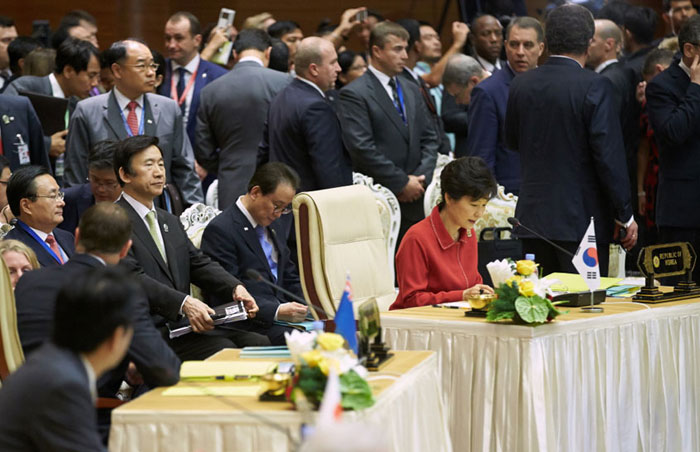President Park Geun-hye shared opinions with 17 other leaders about the joint response to the Ebola epidemic, terrorism and other global and regional issues at the 9th East Asia Summit (EAS) in Naypyidaw, Myanmar, on November 13, proposing a future direction for Korea-EAS cooperation.
Based on the progress the organization has made so far, President Park expressed her hope that the EAS could develop a consultative structure which could respond to new challenges in a more effective and active manner. She proposed that the EAS deepen cooperation in six areas -- the environment and energy, finance, healthcare, education, disaster management and the Association of Southeast Asian Nations (ASEAN) -- and take an interest in and actively respond to global issues.
Saying that, “Asia is the place in the world where most natural disasters take place,” the president emphasized that disaster management is one of the most important issues. She welcomed the adoption of an EAS statement on prompt responses to disasters aimed at minimizing damage through cooperation among neighbor countries.
Park also welcomed the adoption of an EAS declaration on eliminating the illegal trade in wildlife. She also explained Seoul’s plan to create a world peace park in the demilitarized zone where wildlife of the Korean Peninsula is well preserved, allowing both Koreas to create a path toward life and peace through the ecosystem.



In regard to the Ebola epidemic, President Park said, “The outbreak of the Ebola virus threatens the whole international community, not just West Africa.” She expressed her support in the EAS joint statement for strengthening regional cooperation on the joint response to the deadly virus. In order to support the international response to the Ebola epidemic, the president also said that the Korean government has decided to dispatch medical experts to the affected region that very day.
Mentioning the violent extremism of ISIL, President Park said the international community should jointly respond to such terrorism. She added that Korea actively participated in the U.N. Security Council this past September as a non-permanent member and that it supports and will fully implement U.N. Resolution No. 2178 about threats to international peace and security caused by terrorist acts.
Park said that the need to secure marine security is essential for the peace and prosperity of East Asia, as the region is connected by the sea. She urged that securing the safety of navigation routes, eliminating pirates and regional cooperation on marine rescue are all crucial.
At the EAS, participating leaders adopted a declaration on eliminating the illegal trade of wildlife, issued a statement on prompt responses to disasters, encouraged regional cooperation on the response to the Ebola epidemic and released a joint statement condemning the violence and brutality of ISIL.
By Yoon Sojung
Korea.net Staff Writer
Photos: Cheong Wa Dae
arete@korea.kr
Based on the progress the organization has made so far, President Park expressed her hope that the EAS could develop a consultative structure which could respond to new challenges in a more effective and active manner. She proposed that the EAS deepen cooperation in six areas -- the environment and energy, finance, healthcare, education, disaster management and the Association of Southeast Asian Nations (ASEAN) -- and take an interest in and actively respond to global issues.
Saying that, “Asia is the place in the world where most natural disasters take place,” the president emphasized that disaster management is one of the most important issues. She welcomed the adoption of an EAS statement on prompt responses to disasters aimed at minimizing damage through cooperation among neighbor countries.
Park also welcomed the adoption of an EAS declaration on eliminating the illegal trade in wildlife. She also explained Seoul’s plan to create a world peace park in the demilitarized zone where wildlife of the Korean Peninsula is well preserved, allowing both Koreas to create a path toward life and peace through the ecosystem.

Leaders from 18 countries discuss global and regional issues, including the joint response to the Ebola epidemic and international terrorism, at the EAS in Naypyidaw, Myanmar, on November 13.


President Park Geun-hye attends the EAS in Naypyidaw, Myanmar, on November 13.
In regard to the Ebola epidemic, President Park said, “The outbreak of the Ebola virus threatens the whole international community, not just West Africa.” She expressed her support in the EAS joint statement for strengthening regional cooperation on the joint response to the deadly virus. In order to support the international response to the Ebola epidemic, the president also said that the Korean government has decided to dispatch medical experts to the affected region that very day.
Mentioning the violent extremism of ISIL, President Park said the international community should jointly respond to such terrorism. She added that Korea actively participated in the U.N. Security Council this past September as a non-permanent member and that it supports and will fully implement U.N. Resolution No. 2178 about threats to international peace and security caused by terrorist acts.
Park said that the need to secure marine security is essential for the peace and prosperity of East Asia, as the region is connected by the sea. She urged that securing the safety of navigation routes, eliminating pirates and regional cooperation on marine rescue are all crucial.
At the EAS, participating leaders adopted a declaration on eliminating the illegal trade of wildlife, issued a statement on prompt responses to disasters, encouraged regional cooperation on the response to the Ebola epidemic and released a joint statement condemning the violence and brutality of ISIL.
By Yoon Sojung
Korea.net Staff Writer
Photos: Cheong Wa Dae
arete@korea.kr